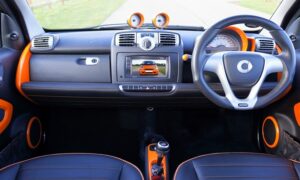The future, they say, is technology, and there’s no clearer portrait of that viewpoint than the bustling automobile industry. Thanks to recent innovations, there’s all manner of new technology making our vehicles smarter and more efficient, but some are wondering if those advances are also making us susceptible to grievous breaches of privacy. That’s the topic we’ll be taking a look at today, as we explore the potential privacy risks of emerging smart car technology.
The New Generation Of Automobiles
When we look at some of the newest cars to grace the roadways—Tesla, Fisker, etc.—what’s abundantly clear is how much these contemporary rides are starting to resemble computers on wheels. Where once automobiles were mainly mechanical beasts, these new iterations feature CPUs, Bluetooth, GPS, and all other manner of ways to transmit and receive data.
As it turns out, all that data could be telling on you. Consider way way back in 2019, when Geoff Fowler of The Washington Post hacked a Chevrolet to find out what it knew:
“On a recent drive, a 2017 Chevrolet collected my precise location. It stored my phone’s ID and the people I called. It judged my acceleration and braking style, beaming back reports to its maker General Motors over an always-on Internet connection.”
That alone sounds suspicious, but what’s more is the fact that Fowler would not have known any of this data collection was occurring had he not done his own investigation, as the vehicle gave no indication that it was recording and transmitting info back to manufacturer HQ. Fowler followed this revelation with an ominous warning in regard to the future of cars:
“We’re at a turning point for driving surveillance: In the 2020 model year, most new cars sold in the United States will come with built-in Internet connections, including 100 percent of Fords, GMs and BMWs and all but one model Toyota and Volkswagen.”
This means that over the next decade, the possibility for your driving data to end up outside of your control is very real, and from there, it can end up just about anywhere.
Some of this might be along the lines of what you expect—cars passing data to insurers to make sure you’re driving responsibly, stuff like that. Since there aren’t any laws restricting carmakers when they collect your data, they can take it and sell it off to other organizations.
While automakers continually offer assurances that they only collect data for noble purposes, and wouldn’t do anything without customer say-so, the potential for privacy breaches in this scenario are as plain as day. It’s for this reason that you’ll want to know how to protect whatever privacy you can when it comes to your automobile.
Staying Safe
Perhaps one of the greatest steps you can take to defend yourself and your data is to stay informed about what features your car comes equipped with and make sure you know what kinds of data (if any) those features allow your car to record and transmit. The Lemon Law was created to protect customer rights in the sale of automobiles against deceptive and unfair business and trade practices. If in any way you feel that you are being deceived in any way with your car purchase, be sure to contact a California lemon law attorney.
Beyond that, being cautious about using any of the apps and programs that come loaded into your vehicle will help you minimize what kinds of personal info might make it out into the proverbial “wild.”



































